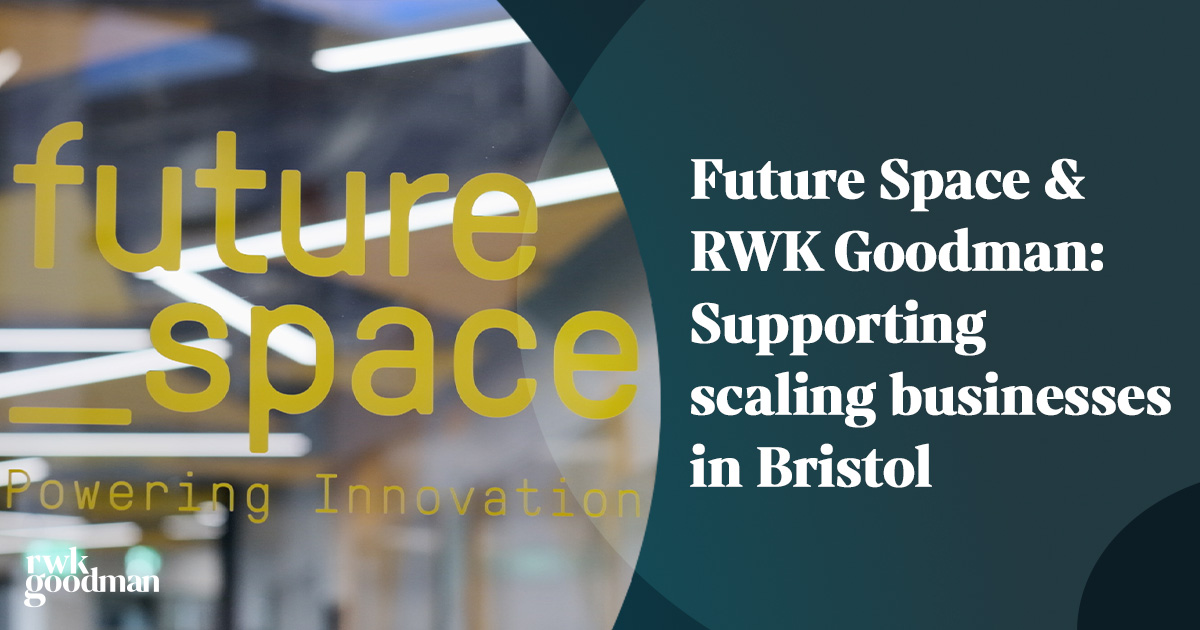In conversation with Anaphite – a founder’s advice for founders.

Scott Preece of RWK Goodman sat down with Alex Hewitt of Anaphite to talk through some of Anaphite’s experience of raising equity investment, and to discuss any key tips Alex would pass on to other founders who may be looking to follow a similar journey.
Scott Preece is a partner in RWK Goodman’s Bristol corporate team specialising in venture capital / private equity transactions, and is the lead for our Technology sector in the South West.
Alexander Hewitt is Co-founder and COO at Anaphite Ltd and leads their fundraising. Anaphite was founded in 2018 and is headquartered in central Bristol. Anaphite believes that creative chemistry will accelerate the energy transition. Anaphite specialises in formulation and process technologies for dry coating of electrodes. Anaphite works with the battery industry to optimise dry coating, manufacturing better and more sustainable batteries at lower cost.
Scott asked the questions and Alex provided the responses.
How much investment have Anaphite raised to date?
So far, $23 million.
Thinking back to the pitching process, clearly belief in a product, a strategy and a well-articulated awareness of a target market is important, but are there other key points you’ve identified from your experience?
Of course. Those things are all key as a starting point to a successful pitch, but at the early stage, ultimately I think it’s important to demonstrate that you can take a concept, effectively think through the risks that might make it fail, and how you plan to mitigate them. Then drive home the reasons why if it is successful, the benefits significantly outweigh the risks of failure.
Because you’re not just selling the idea, you’re selling your ability to adapt and change as you grow that idea.
Understanding your audience is also important – for example, angel investors are obviously interested in product, strategy, etc, but if you’re pitching directly to an angel one on one, often it can be moreso about how you come across and their belief in you as a founder and your ability to build a team that can deliver what you’re pitching.
Touching on that point of understanding the audience; did you do any preparation before speaking with certain investors? Would you tailor your approach to each investor / fund depending on what you thought they might be looking for?
Absolutely. There are various platforms you can look at which are great for this – Beauhurst, Shipshape, Crunchbase – some do have a cost, but if you can get access to these they have can really good insight into the preferences and activities of any given fund.
You can basically tailor your search for the VCs that invest in your sector to get an initial shortlist. I then went on to look at their website. You look at their portfolios, you find out if they’ve invested in something like this before. Then try to leverage your network to get warm intros (if you are super early and don’t have much of a network yet, then get yourself out there at conferences to meet investors, other founders and potential customers – some will probably be a waste of time, however as you go to more, you will get better at selecting which to go to and be able to get more from each one). Or failing that, send them a cold message via email or LinkedIn etc, (although it is the lowest conversion rate approach, its value shouldn’t be underestimated).
Once you understand more about what they’re looking for you can tailor your approach to them when pitching – so if you’re talking to a VC who’s invested in your specific sector many times before, they might want to dive straight to the technical detail. If you’re talking to a VC who’s more of a generalist, then they’re probably going to want to focus more on the big picture, the potential returns and when they could likely expect them.
This is just like for anything – when you are selling something, you must know your audience. If you have an opportunity to know your audience before you sell something, take it!
Was there anything that particularly surprised you about the investment process?
Every fundraise has taken longer than I thought.
It’s been a good thing in the long run, but for us most of the added time has been spent adapting to investors’ needs. If you’re making a product you normally go out and ask people, what do you think of this? How would you like to use this? Then you adapt the product as needed. With investors, it’s sort of the same – you might think “this is my business, I want it to do this”, but then you go to pitch and the investor says no, we’re not interested in that, or they ask you an important question that you realise you don’t have a good answer to yet. So you have to reset. That takes longer than you think! You start to think about am I approaching the wrong investors, or is the plan I have not right for the current market. You need to try and find the investors, the market and the pitch that will get you the funding you need and the people who believe that you have the right vision for five years down the line.
I counted the number of pitches I did to investors for our recent Series A round, and it was at least 100 VCs over the course of a year. Of these, about 25 of them wanted to sign an NDA and get into our data room. Of those 25, about 12 were interested in investing somehow – so we went to investment committees, visits to us, multiple rounds of questions with their partners, due diligence. Then those 12 went down to closing the round with one lead investor and three followers. So we’ve got 96 no’s, of which 75 of them were a pretty easy no – it was just a pitch and then didn’t work. But around 20 of those no’s involved hours and hours of work and effort.
You actually get to know your company very well through that process. The more times you get asked their questions, the better you become at answering them. Being prepared definitely helps, but it never gets easy – you can prepare data on what you think investors will want, but then they could ask for something unexpected which takes you a month to get together, and that now is your bottleneck which adds a month to the whole process.
After pitching, is there anything you’d like to flag which can hold up the process?
It’s very easy to find a small clause somewhere that holds everything up. It could for example be the details of a leaver clause or a reverse vesting schedule.
[Note from Scott: Alex is right to identify leaver clauses and reverse vesting as a particular point of contention, as in our experience this tends to be one of the more heavily negotiated points. Ultimately it involves putting at least some of a founder’s shares on risk if they were to leave the business in different scenarios, so this can feel very personal to founders. Granular but important items like these can hold up deal progression so early review of where these roadblocks may occur can greatly speed up the process. A report by Mountside Ventures, Beauhurst and others in 2022 found that vesting appeared in around 98% of Series A rounds so it really is a common occurrence. We would advise founders and investors to discuss their views on this as early on as possible.]
Although these discussions can be difficult, having trusted and experienced lawyers on hand definitely helps to smooth the process out. They fight your corner, they spot when things look weird. If you’re buying a car and someone tries to charge you well above market, the only way you know that is by knowing what the market actually is.
If you’re working with a lawyer who’s already done many of these deals, they know the market norm and can advise you accordingly – pointing out where something is weird, unusual, or where you shouldn’t accept something because what is being asked for is too unreasonable.
Do you have any other key tips you’d like to share with other founders?
-
Test your pitch early on
ideally with investors who aren’t your key targets and maybe aren’t the most likely to join a round. This gives you a chance to refine and improve it before you get to your top picks
-
Be as prepared as you can be in terms of data rooms
collate information in an organised way so you can easily refer to documents when asked by investors. You can’t always know everything they’re going to want, but you can prepare as best you can.
-
You’ve got to balance all interested parties
your board might have one set of interests, existing investors will have theirs, and the new investors coming in will have their own interests. Bringing everyone along is a lot harder than you might first think. Have conversations and be open early on and try to keep all interested parties updated to avoid unnecessary surprises.
-
What are your red lines?
if there are certain red lines for you, that would make you feel very uncomfortable if crossed, talk about them with your investors early on in the negotiations. At the end of the day, you’re about to form a relationship with that VC, and if you go into that relationship with any sourness from day one you could be setting yourself up for failure right from the start. And the VC, if they’re a good VC, should understand and appreciate that.













